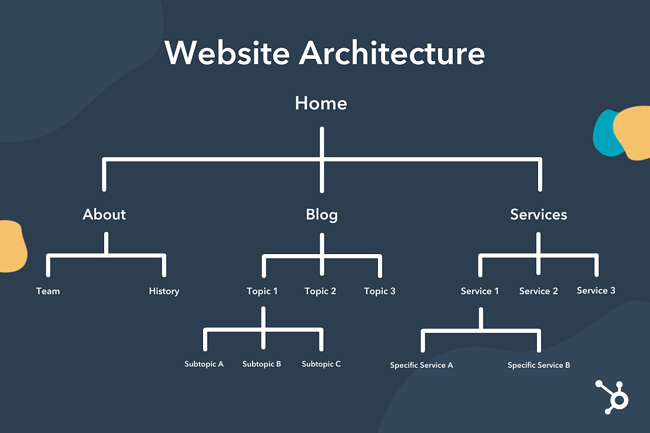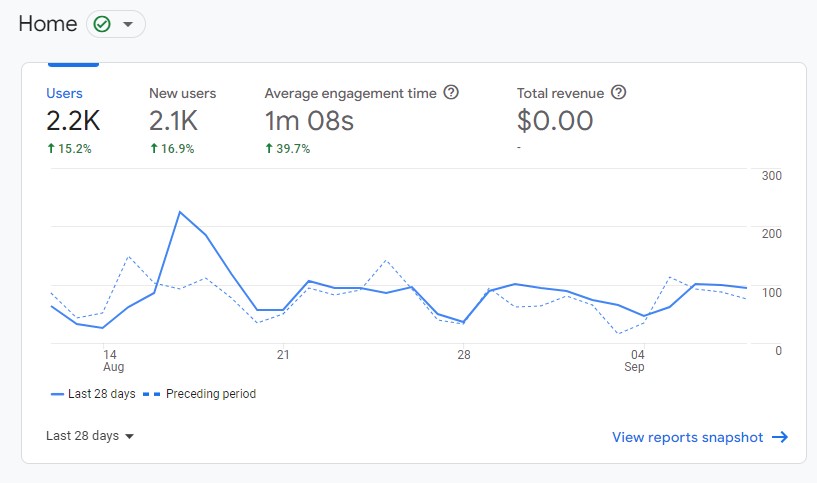Search Engine Optimization Advice to Help You Rank Higher in 2022
While at first it may seem pretty straightforward, search engine optimization (SEO) can be a lot to tackle for small businesses that wish to boost their search engine rankings. Often overwhelmed by “paralysis by analysis,” many small teams simply quit or refuse to start altogether in maximizing their website for organic search traffic.
However, building a strong web foundation for SEO is critical for growth in our digital world. It can take the lion’s share of effort and legwork to begin the process of earning a steady supply of organic traffic, but it’s worth it. By anchoring your SEO efforts around these 12 beginner tips, you should be well on your way to optimizing your search engine presence to reach your target audience on the web.
1. Design Your Website Intentionally
If you haven’t created your website just yet, you can strategically optimize it to be more easily readable for search engines through a few key practices. This will save you hours and hours of headaches later down the road trying to overhaul a beautifully-designed website that might be hindering Google’s ability to crawl it.
Additionally, designing your website to function properly for mobile users before making adjustments for desktops will ensure that your mobile design is adequately developed. Even if mobile users do not make up a very large portion of your traffic, mobile-friendly websites have become critical since Google began a mobile-first indexing practice for crawling websites in 2019. Essentially, this means that Google reads the mobile version of your website primarily when determining where you rank in the search results.
2. Develop an SEO Strategy
While a small business might have limited time and resources to pour into SEO, it’s still important to develop some SEO strategy. But what exactly goes into an SEO strategy? Asking some key digital marketing questions can help to orient your efforts:
- What goals do you hope to achieve through increasing your website traffic?
- Who is/are the target market segment(s) you are trying to reach, and where are they in their customer journey?
- How do you want to construct and implement a content plan?
- What specific conversions or actions are you targeting once you bring these users to your landing pages?
- How will you measure and track the success of your SEO strategy efforts?
3. Think Like Your Customer
It can often be jarring to learn what customers are actually searching for online or find out your website is not nearly as intuitive and user-friendly as you first thought. That’s why taking a fresh exploration of your website’s content, ideally with someone who has never seen it before, can be a small but critical step in identifying areas of improvement.
4. Build Up Quality Backlinks
To the Google search algorithm, good backlinks are key. A backlink is when another website links to your site, essentially endorsing you. Google values backlinks as a mark of credibility and uses them to determine how websites rank within the search results.
So how do you even get quality backlinks as a small business? There are a few different strategies you could pursue. One of the cleanest—and inevitably slowest—methods is to produce quality material and content hosted on your site that other pages and blogs will want to link to. Reaching out and emailing high-authority blog pages that are already linking to similar pages and asking them to consider linking to you can always be a good step. You may need to be willing to give something in return, such as writing a guest post. Building connections and communicating with actual website authors enhances your backlink profile.
5. Target Critical Keywords
After considering what your customers might be searching for and using keyword research tools, you can then aptly target critical keywords. Once you’ve determined which keywords you want to rank for, optimize your page URL, title tag, and H1 (header) for the most impact. Helium SEO deems these the “Three Kings” of SEO—they drive the biggest changes for rankings.
When targeting a keyword, however, there are two big caveats to consider. Try to stick to only a few important keywords per page. If you aim for too many keywords for one page, you can inadvertently dilute that page’s potency. When you branch out to several ideas, Google determines you don’t have a central point and you won’t be topically relevant.
6. Study the Competition
When trying to dominate the digital space for your niche, looking at competitors’ websites is a great practice. It’s quick, easy, and free while offering a meaningful payoff. You can get insight into what your customers are searching for and identify content you can create to outrank the competition. Here are some good questions to consider:
- Who is ranking above you for certain search terms?
- How are their pages different?
- What other features on their website do they include that you don’t?
- Is the user intent in the search query being satisfied by the existing content displayed in the search engine result pages (SERPs)?
- Are there certain keywords that seem to produce a wide variety of less-related results? (This could signal a better opportunity to rank for the term.)
Want More Digital Marketing Tips to Manage Your Business?
Get monthly insights on SEO, SEM, and CRO that drive results.
7. Produce Regular Blogs and Multi-Channel Content
Blogs are a great way to reach customers in the early stages of the purchase path and also target specific keywords through quality content. Answering user questions, providing advice, and commenting on industry trends/news are all great ways to generate content. As a website, your website will naturally grow by ranking for specific keywords that can draw in potential customers. Plus, the latest Google core update in May 2022 showed signs of favoring websites that frequently produce blog content.
8. Rule Your Local SEO
Depending on the size of your company, your customer outreach, and—of course—your budget, it is important to realistically understand the extreme competition for ranking in the search results on a national scale. That’s where local SEO comes in. Search engines give extra priority to helping local businesses rank higher on the pages of users within a close geographic sector.
- Get your site listed on as many relevant site directories as you can. Whether it is city business listing pages to indexes of your niche products or services, everything helps.
- Build out your free Google My Business profile as extensively as you can. Providing your business name, business phone number, address, website, email, and more will work wonders for helping your site appear locally on search results.
- If your business exclusively, or almost exclusively, serves a local area, include that area in your title tag, H1, and meta descriptions. This can give Google, and thus users, a better understanding of where precisely your business serves.
- If customer reviews are relevant, consider adding space for those on your site or set up an account with local business review websites specific to your field, if appropriate.
9. Monitor Your Results
Taking these steps to maximize your rankings in Google are all great ways to increase your website traffic and potentially your conversion goals, but how will you be able to determine success if you’re not tracking your progress?
Creating a free Google Analytics account and easily linking it to your website will provide the means to be able to track a variety of valuable data about the traffic your website is earning. From pageviews to bounce rate, to channels of acquisition, to viewer exit rates, even a foundational setup with the program can provide critical marketing insights for determining what areas of the site are working and which ones need some attention.
Google Analytics also allows you to track specific conversion rates based on your website’s goals. These goals are desired actions you want users to take, such as filling out a form or making a purchase. Knowing your website’s results can help you optimize for more conversions—which is known as CRO (conversion rate optimization) in digital marketing.
10. Identify Outlying Problems
Another free platform that’s great for checking your site’s well-being is Google Search Console. GSC helps you monitor how Google views your website. You can create a sitemap with Search Console to ensure your site is read correctly which can boost your rankings.
On the other hand, you can troubleshoot any potential problems with GSC. Google warns you of any URLs that are “poor” or “need improvement.” By monitoring crawl stats from Google, this program can be beneficial in revealing technical errors in your HTML or site structure that might be holding you back in the search results.
11. Be Patient
SEO takes time—a lot of time. Many businesses just getting started in optimizing their organic traffic are shocked by how delayed the results of the process can be.
Generally speaking, results will begin to show around four to six months after changes have been implemented. This can make tracking individual aspects and modifications difficult, specifically in the early stages of the process. However, be encouraged that things will soon pick up speed, and the initial legwork requires the most patience to eventually reap the harvest of one’s hard work farther into the future.
12. Know When You Need to Outsource
If you’re new to the game, SEO can certainly seem overwhelming, particularly for small business owners with limited time and resources. By its very nature, search engine optimization requires a generous amount of time and attention to be even moderately successful.
Unlike simply dishing out a large portion of your marketing budget to display your content on a billboard, small business SEO requires a hefty amount of upfront work in addition to regular maintenance and ongoing care to adapt to Google and users’ changing preferences. Of course, this can bring along a hefty cost of time and money to do well.
Is SEO Even Worth It for Small Businesses?
For many small businesses, time and attention are often the resources in the shortest supply. This makes it nearly impossible to devote the proper work needed to make a significant difference in radically increasing your website traffic, even following these SEO tips. That’s why in many cases it might be the best idea to consider outsourcing your SEO to make sure this facet gets the necessary and effective attention that it needs.
Outsourcing can also alleviate the very real risk that much of your invested time and work will all be for the production of minimal if not negligible results due to poor strategy, unidentified errors, or improper investment. But keep in mind that professional search engine optimization can have huge results. For example, experts can take your website from 1,035 unique visitors per month to 13,392 (like Helium SEO did with RVnGO) or increase website leads by 373% in under a year (which is what we did for Apeks Supercritical).
With SEO professionals on your team, you’ll garner more data for your business, enhance your online presence, and yield a better return on your investment—among many other benefits. Ultimately the decision will be up to your specific digital strategy, goals, and budget. However, as digital presence grows even more important and utilized by consumers, many small businesses are finding it very financially lucrative to begin to outsource these services. It’s no surprise why, according to Forbes, over $80 billion each year is being spent on SEO alone in the United States. And that number is expected to continue to significantly increase.
Learn More with Helium SEO
Want to start investing in the digital space today by elevating your search engine presence? Get in touch with us to learn more about how we can help you.









